This September and October, we’re taking a look at the jam-packed 1994 to 1995 season of Star Trek, including Star Trek: Deep Space Nine and Star Trek: Voyager. Check back daily for the latest review.
Past Tense, Part II is a nice way to close out Star Trek: Deep Space Nine‘s solo run, the only period in the show’s history where it was the only Star Trek on television. Caretaker, the première of Star Trek: Voyager, would be the next episode of the franchise to air. Deep Space Nine spent a lot of its early third season attacking various foundations of the Star Trek universe, as if hoping to demonstrate how profoundly different the show was from its predecessors.
The Search promised a war brewing on the horizon, and presented a cynical view of Starfleet foreign policy, where pacifism amount to appeasement. House of Quark reduced the Klingon Empire to a joke. Equilibrium suggested that Sisko could live with (and passively enable) a government lie if it kept his friend alive. Second Skin hinted that things might not be as they appear to be. The Abandoned embraced the idea that sometimes people are incapable of being anything more than what their genes might tell them to be. Defiant was the story of sibling desperately trying to prove his unique identity.
Part of me wonders if this very cynical stretch of episodes is responsible for the perception of Deep Space Nine as an incredibly cynical and pessimistic television show – one consciously at odds with the utopian ideals of the franchise. After all, this was the stretch where Deep Space Nine was most in the spotlight. It had the spot previously allocated to Star Trek: The Next Generation in most markets. It had no televised competition. If ever Star Trek fans were going to jump on board Deep Space Nine, this was the moment. It seems quite possible that this run of episodes cemented the show’s reputation.
So it seems strange that Deep Space Nine should wait until its last possible moment in the sun to embrace the humanism and optimism at the heart of the franchise. Past Tense is a story about building paradise, and about how humanity has the capacity to be so much better than we currently are. In short, it’s quintessential Star Trek, right down to the occasionally heavy-handed moralising and utopian idealism.
Of course, Deep Space Nine has a very different view of the future than most other Star Trek shows. The Next Generation and Voyager take utopia as a starting point. They assume that there is a future where mankind has conquered greed and hatred and war, a future where peaceful coexistence is the norm. In such a world, people are perfect. You take away poverty or hunger or materialism, and people are immediately the best that they can ever be.
As a rule, Deep Space Nine isn’t convinced by this logic. It sees the argument as somewhat cynical. To quote Sisko in The Maquis, Part II, “It’s easy to be a saint in paradise.” This is a way of externalising mankind’s problems, by suggesting that the negative aspects of humanity’s character are only pushed to the fore by outside circumstances. It treats poverty and world hunger as the cause of mankind’s flaws, rather than suggesting that mankind’s flaws might be contributing to those on-going problems.
As Ted Friedman contends in Electric Dreams: Computers in American Culture, there are times when the utopia presented by Star Trek is rooted in technological determinism, the idea that technology defines society and not the other way around:
In as ubiquitous a dream of the future as Star Trek, for example, the replicator, a machine that can produce a copy of any object, appears to have done away with the market. The economy instead seems to work under the principle “from each according to his ability, to each according to his needs.”
This form of futurism may seem hopelessly technologically determinist, less about the future we want than the future machines will give us. Capitalism may disappear in Star Trek, but only because of a deus ex machina: the replicator.
That’s what is so frustrating about episodes like The Neutral Zone, where the franchise presumes to lecture its viewers. If utopia is built on a fictional technology, then it’s hard to really blame mankind for any of its current problems.
Deep Space Nine is critical of this perspective throughout its run. It suggests that mankind’s vices can still exist in a world with the replicator, and that those vices are rooted in problems that can’t necessarily be solved by technobabble. Humanity can be better than they are, but it takes genuine effort – it’s hard work, earned fairly. Sisko isn’t a perfect human being by virtue of being born in the future, he has to fight every day to do the right thing when easier and less correct options present themselves.
That’s part of what makes Past Tense so interesting. It demonstrates that mankind has to course-correct itself if it wants to build a better world. It can’t wait for warp drive or replicators to make the world a better place. There has to be societal change in order to build a better future, to make a world like Star Trek possible. That change is grounded in how people react to the circumstances around them, how they respond to things happening in the world.
In fact, Past Tense, Part II explicitly rejects technological determinism. It was produced in late 1994. The internet already existed. The writing staff were aware of it. Ronald D. Moore has talked about printing off negative reviews and distributing them around the office. Robert Hewitt Wolfe directly engaged with fans via Usenet. The writing staff would answer questions and write on-line. Mike Okuda tried to protect the plot of The Best of Both Worlds, Part II by leaking false spoilers on-line.
So the writing staff were aware of the internet. More specifically, the writing staff were aware of the freedom presented by the internet – the way that it offered an opportunity for conversations that might not otherwise occur. However, in the not-so-distant future of Past Tense, the potential of internet has effectively be neutered. B.C. needs Vin’s “access code” to log on to the net to see what the news is reporting. The government can cut off all internet access inside the sanctuary district. Chris talks about his “interface operating license”, as if to suggest the net has been thoroughly regulated.
In short, the opportunity represented by the internet – the capacity for better communication and access to a wide range of ideas and philosophies – can easily be curtailed and restrained by broader societal pressure. The internet in Past Tense seems much more regulated than it would have been in 1994. It probably seems ridiculous to fans watching the show today. At the same time, it’s not too far removed from the type of censorship that occurs in China.
So Deep Space Nine suggests that the utopian future presented in Star Trek is not just about developing magic technologies – it’s about mankind moving to the point where it can use those technologies for its own betterment. It’s a more nuanced view of how mankind evolves than the version typically presented, but it is a Deep Space Nine‘s own peculiar brand of utopian thinking. Like The Next Generation or Voyager, the show embraces the idea that mankind can be better. Deep Space Nine is just ready to concede that it’s harder than it looks.
Past Tense uses time travel as a means of challenging the audience, as Sisko shapes the past and asks how mankind will shape its own the future. In To Boldly Go When No One Has Gone Before (or After): Star Trek’s Timelines, Karma Waltonen argues:
Time travel is always about history. We confront our own histories as individuals and as a species, and we must accept that we create our children’s history. Star Trek forces us to think about our past through colonial or missionary allegories, our present cultural hegemony, and our future, either something immediate, as in the twenty-first-century apocalypse, or a more distant future. In all futures, we have the possibility to be better. Star Trek’s time travel forces us to consider time itself as something that “carries with it the highest moral obligation.”
In Past Tense, Sisko steps into the gulf between the world as it exists now and the optimistic future projected by Star Trek. The fact that this episode is built around a key issue in the mid-nineties only cements that idea.
What’s interesting about Past Tense is that the story doesn’t feature a bad guy. As much as Sisko tries to keep things under control, he doesn’t find himself pitted against one figurehead. Sure, he has to keep B.C. from killing the hostages, and Vin from getting himself killed, and negotiate with the local police, but there’s a sense that Sisko is dealing with something a lot less tangible. The real enemy is the system around him. We even get a short little scene of how the police negotiator is ultimately powerless in the grand scheme of things; just a cog in a large machine.
And Past Tense suggests that the system responsible for these horrors isn’t built on malice or hatred, but on a broader sense of apathy. Lee relates how an early encounter left her emotionally numb. “Ever since then I’ve just done my job, you know?” she asks Bashir, as if seeking validation. “Tried not to let it get to me.” When Sisko confronts Vin about his lack of empathy for the residents, Vin responds with practised apathy. “What do you want me to say?” he demands. “That I feel for them? That they got a bad break? What good would it do?” As far as Vin sees it, even empathy is wasted. Sisko responds, “It’d be a start.”
It’s telling that the actually riots accomplish very little. The riots are put down rather swiftly and brutally. Given how the SWAT team remarks that they are moving on to “pacify” the rest of the district, one gets a sense that this is a blood bath. However, it isn’t the armed revolution that is the point. It isn’t the guns that change the world. What matters is getting people to pay attention. Trying to convince Chris to support the residents, Dax argues, “And unless the public learns why the Sanctuary residents did what they did, all those deaths will be for nothing.”
That’s the cornerstone of the changes that need to be made, the path that leads to the Federation. People need to be reminded to care. People need to feel empathy for one another – utopia needs to be built on compassion. It’s a very heart warming message, and one perfectly in keeping with the broader Star Trek ideal of a utopian future. In short, Past Tense might just be the most Star Trek-y episode that Deep Space Nine has produced this far into its run.
Sure, it’s occasionally heavy-handed. In particular, the final exchange between Bashir and Sisko feels a little on the nose. “You know, Commander, having seen a little of the twenty first century there is one thing I don’t understand,” Bashir observes. “How could they have let things get so bad?” Sisko thinks on it a second and responds. “That’s a good question. I wish I had an answer.” Bashir and Sisko both try very hard not to stare at the viewer through the camera lens and ask “do you?” At the same time, heavy-handed moralising is something of a Star Trek staple, so hard to complain too much.
There are lots of other nice touches. O’Brien and Kira’s adventures in time travelling provide a nice link back to The City on the Edge of Forever. It also created a nice sense of the passage of time – the duo dropping in on the same street corner in the thirties and the sixties, all leading towards the period where Sisko is trapped. It’s an interesting way of looking at time – witnessing the history of one particular place. Landing in the sixties is an affectionate nod to the franchise’s roots in sixties idealism.
Landing in the thirties is probably a nod to The City on the Edge of Forever, given Deep Space Nine‘s fascination with time travelling within the Star Trek framework. That said, there is a nice sense of cyclic history to this, with Kira and O’Brien’s first foray landing them during the Great Depression. It’s not too dissimilar from the time where Sisko landed. History repeats. Patterns recur. Of course, given that both characters can pass as white, it makes sense that they meet with the upper class, much like Dax did.
Indeed, it’s nice how issues of race and class play into Past Tense without being explicitly mentioned. When Sisko suggests that Webb should negotiate on behalf of the district he explains, “But they can’t dismiss Webb as easily as you or me. He’s got the face. He’s got the family. He’s the guy next door. And that’s what they need to see.” Although Sisko doesn’t say it, it also seems to be because Webb is white and middle-class.
It’s a nice way of acknowledging Sisko’s awareness of the history of prejudice on Earth without making a big deal of it. It fits with Sisko’s own expressed interest in his cultural heritage (cooking and art) and with later episodes like Far Beyond the Stars and Badda-Bing Badda-Bang. It’s never leaned on too heavily, but it is definitely there. It underscores the idea that prejudice doesn’t just magically disappear at some point; it is tied into all those human problems.
It’s also worth noting that Past Tense, Part II also hints at the idea that this might be a pre-destination cycle – that Sisko may have been meant to land in the past and fill the role played by Gabriel Bell. In the first part, Sisko doesn’t recognise Gabriel Bell by his appearance, despite his interest in the man. Sisko and Bashir only identify Bell by his food card. Existence appears to be threatened at the moment Bell dies, but it’s actually threatened after Starfleet orders Kira and O’Brien not to retrieve Sisko.
Here, it’s suggested that the original riots probably couldn’t have happened as Sisko recalls. The residents need to get their stories on-line, despite the government shut-down of the internet. Sisko worries that history will be adversely affected if they can’t get those narratives on-line for people to watch. “Because according to history, the residents were able to get onto the Net and tell their side of the story,” Sisko contends. “Millions of people watched.”
When Bashir points out that nobody has been able to get past the lock, Sisko remarks that maybe it was Bell who did so. Maybe Bell did, but the episode makes a point to immediately explain how Sisko-as-Bell will get past the locks. No sooner has Sisko realised that history is going askew than Dax appears with a convenient solution. Bell might have come up with his own solution, but the episode doesn’t play it for suspense. Sisko is offered a solution that would never have been available to Bell. That seems to suggest that there’s some reason to this.
Finally, it’s worth noting how much sympathy the writers seem to feel for B.C. The fact that he murdered Gabriel Bell is intentionally avoided over the course of the show, to emphasis that B.C. is a character who has been shaped by his environment and circumstances. It does feel a bit weird that nobody even broaches the topic, though – one would imagine that placing a murderer in charge of a bunch of hostages was a potentially risky proposition. (Although Sisko directly questions the capacity of other “ghosts”, he never seems too worried about B.C. himself, despite the fact he has seen B.C. take a life.)
It’s weird that B.C. seems to inherit a number of personality and character quirks from Deep Space Nine producer Ira Steven Behr. He wears an outdated hat quite similar to the one that Behr sports quite frequently, and he also expresses both a love of baseball (having the Sisko-arbitrated correct answer to the best baseball team of all time) and classic cinema (“Errol Flynn was born is Tasmania!”).
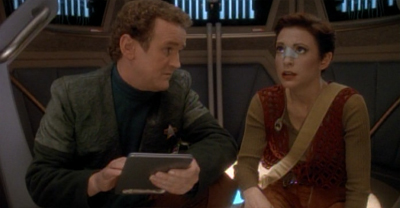
“We probably should have been a bit more logical in our search rather than using the default date sort.”
There is a sense that Past Tense, Part II is a little padded in places. In particular, the scene with Clint Howard seems to exist to eat up a few minutes of screen time – and to provide an Iggy Pop cameo that didn’t work out. There’s a sense that Past Tense might be stretched to fit the two episode format – too much story for one episode, not enough for two. That said, when the filler includes Kira and O’Brien as temporal tourists, it’s hard to complain too much.
Past Tense, Part II is a little heavy-handed, but it is a very worth (and underrated) addition to the canon, and nice reminder that Deep Space Nine can do a story very much in the mould of classic Star Trek. When it wants to.
You might be interested in our reviews of the third season of Star Trek: Deep Space Nine:
- The Search, Part I
- The Search, Part II
- House of Quark
- Equilibrium
- Second Skin
- Supplemental: Fearful Symmetry by Olivia Woods
- The Abandoned
- Civil Defense
- Meridian
- Defiant
- Supplemental: (Malibu Comics) #29-30 – Sole Asylum
- Fascination
- Past Tense, Part I
- Past Tense, Part II
- Life Support
- Heart of Stone
- Supplemental: (Malibu Comics) The Rules of Diplomacy
Filed under: Deep Space Nine | Tagged: deep space nine, gabriel bell, homelessness, Past Tense, past tense part 2, pre-destination, Sisko, star trek: deep space nine, Television, time travel |


















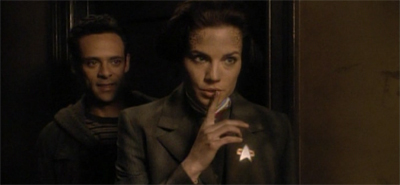

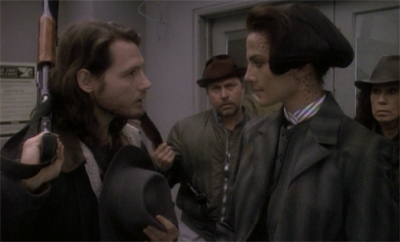


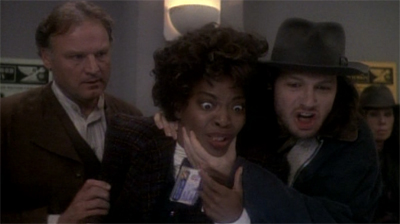




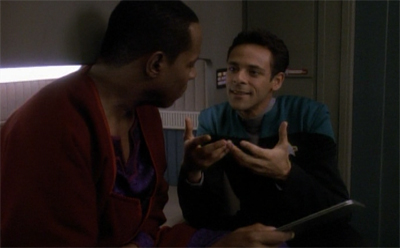





The note about technological determinism makes me wonder how much Roddenbury and McLuhan might have influenced each other. Not that I know much about either, but McLuhan’s famous “media is the message” seems to fit well with Trek utopianism — the technological “media” carries the “message” of social and moral progress.
Careful, don’t give the FCC any ideas. 😉
Yep. It’s a very nice, very comforting thought – the idea that we are as good as the world allows us to be. It makes it easier to feel better about ourselves, because it’s perfectly reasonable to be violent and aggressive when we have to compete for land and resources. However, it always struck me as a little too happy and comfortable. It’s a viewpoint that argues a better world is dependent not any any change from within mankind, but on magic technology that will solve all our problems. Maybe I am a cynical, but I’m not sure giving everybody a replicator right now would turn the modern world into the world of Star Trek. That’s why I like Deep Space Nine so much, it is the only Star Trek where it seems like doing the right thing is actually tough, which gives it a bit more weight.
Does the government of this future actually regulate the whole internet like this with access codes and licenses or is this just the way it is with their own secure facilities, databases, sites and contractors as we don’t actually see how it is anywhere else. Chris mentioned removing tatoos and meeting an image to get government contracts; those might be why he had a way to get past the block so readily.
That’s a fair point. Perhaps it’s just not anything that the episode had time to explain. (Or, more likely, something it did not feel that it would have to.) It is a detail that really seems incongruous in 2015, when we’ve learned that the internet is almost impossible to police. Then again, the fact that so much else in the two-parter feels so pointed and relevant is a testament to the scripting.
Does the government of this future actually regulate the whole internet like this with access codes and licenses or is this just the way it is with their own secure facilities, databases, sites and contractors as we don’t actually see how it is anywhere else. Chris mentioned removing tatoos and meeting an image to get government contracts; those might be why he had a way to get past the block so readily.
PS: Would Chris actually lose his license with the ratings this will get him? The governor is implied to have made up his mind based on how it went with other disturbances and rumors the hostages have been killed. It is also indicated by BC that everyone outside seemed to be acting surprised there was a problem (it had been ignored). The stories we see broadcast right before the national guard moves in suggest Bell was only the most famous martyr of the riots. Hundreds were killed though.
I would argue that the story is more likely to be severely detremental to both the governor and those who try to surpress that.
Yep, but that’s something you can’t know until it’s done. It seems like nothing like this has happened before, so Chris has no frame of reference for what might happen. It’s weird how quaint the media stuff in Past Tense feels almost two decades on.
Robert always capitalizes the “I” in the word “Internet”.
Thanks Robert.
O’Brien and Kira always appearing in the same space and time derives from HG Welles The Time Machine, as opposed to most time travel fiction that ignores that precept. Something the Back to the Future trilogy knew too.
BC’s characterisation is interesting the way he goes from the villain of Pt1 who condemns Earth to a bleak future by killing Gabriel Bell to a more complex character in Pt2 who, although he has a hair-trigger temper, is not really such a bad guy. He was just someone ground down by the system and not liking it one bit. In a more ideal situation, he could have been an ordinary Joe, blue-collar worker punching a clock 9 to 5 every weekday.
Good spot on the Time Machine reference!
(Personally, I like Warren Ellis’ observation that every time machine mush logically be a space machine as well, given characters don’t materialise in space or the centre of the Earth.)
Shame this episode didn’t take place 14 year earlier, we could have had Sisko face off against Governor Arnold Schwarzenegger. I know so far, only Stephen Hawking is the only one to portray them-self in the franchise, so it would be cool if they remastered this episode (changed the time travel date) and added scenes of Arnold at his desk in the governor’s office, or outside the district with a megaphone trying to resolve the hostage crisis. Even if it takes place in the alternate Star Trek timeline with Khan and all.
Ha!
Somehow I doubt a former Republican governor would want to be tied to an episode about Sanctuary Districts, which I think Behr described as something that actually came close to happening in Los Angeles.
Yep, life very nearly imitated fiction.
It’s nice to see Alara using Kira’s trick of trying to fit in among aliens in episodes of The Orville. I loved Kelly’s explanation more than Kira’s – Alara’s paying the price for being a crack addict.
Great review of this two-parter. I only now realized it is somewhat the opposite of “City on the Edge…”, although in the end history does play out the way it had to and even without any loss (Sisko survived, Kirk’s heart broke).
What I find to be at least a bit of a stretch given our current media system is the idea that the sacrifice of one person might trigger societal changes on such a massive scale. Look at the US (or other countries) today: Social protests, individual sacrifices etc. seldomly carry any weight or have lasting consequences. In the US they even acerbate the political climate further. Only in poor “developing” countries like Norther Africa we see people burning themselves as (alleged) triggers of civil war. But those do not seem to further social progress… Then again, we can only place our bets on the long term. But in the long run we are all… dead. Still it is nice that DS9 showed this kind of optimism. Especially because of the awareness of socioeconomic factors this two-parter inspires me even today a lot more than the forced optimism in “ST: Discovery” where progress and change seems to be reduced to diversity and individual choice.
That’s fair. There was a really great piece about Past Tense written recently, arguing that it is one of the best episodes of Deep Space Nine. I’m not sure I agree, but I think it’s massively underrated. Here’s the link:
https://www.theatlantic.com/entertainment/archive/2017/10/star-trek-deep-space-nine-past-tense/542280/
Markus, yes there was loss in order for history to be set to rights. In both versions, good men like Gabriel Bell and Webb had to die to bring about the end of the Sanctuary Districts, and even a misguided man like BC finds a measure of redemption in the last act and ultimately becomes a tragic character. One of my favourite Trek two-parters.